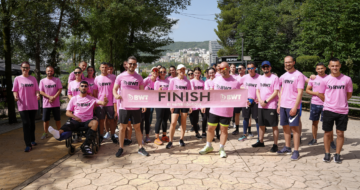Artificial intelligence detects signs of blindness

MONA, a technological spin-off of KU Leuven and research institute VITO, has developed artificial intelligence that can detect the first signs of blindness.
MONA, a technological spin-off of KU Leuven and research institute VITO, has developed artificial intelligence that can detect the first signs of blindness.
MONA, a technological spin-off of KU Leuven and research institute VITO, has developed artificial intelligence that can detect the first signs of blindness. Starting this year, the technology will be available to hospitals and ophthalmologists.
The technology is currently focused on diabetic retinopathy, a condition caused by diabetes that causes the blood vessels of the retina to become damaged. In the long term, the disease can lead to blindness. An annual eye examination is necessary to detect the condition in time, but not all patients get tested enough.
"Our technology allows us to detect the risk of diabetic retinopathy with a single eye scan," says Olivier Ménage, CEO of MONA. "We can also detect the disease from a very early stage, and the technology is cost-effective. The accessibility for screenings is increased: that is why it is such an important innovation."
Currently, the research team is improving the technology so that it can eventually detect glaucoma as well. For this, it could receive the European quality label CE in 2023, which it already has for detecting diabetic retinopathy.
In the future, numerous other diseases could even be detected by unleashing artificial intelligence on eye scans, Ménage makes the case. These include Alzheimer's disease and cardiovascular conditions, where links can be seen with the state of a person's eyes.
Latest insights & stories

ROAD SAFETY
Since 2018, the number of traffic casualties in Flanders has risen again. Currently, the figures are stagnating, but the risk of accidents with injuries remains high for vulnerable road users in Flanders. And that while traffic should be safe for all users and modes. We want to change this by focusing on transparent policy, training on safe behavior, infrastructure improvements, legislation and enforcement.

What is needed for a more circular construction sector? Insights from Sien Cornillie, Circularity expert at NAV
NAV, or "Netwerk Architecten Vlaanderen," is a professional organisation for architects in Flanders. It offers various services including professional development and advocacy for the architectural sector. NAV also fosters networking opportunities and provides advice on legal, technical, and management aspects. The network is currently working on a position paper on circularity. We sat down with Sien Cornillie, an expert on circularity and energy at NAV. This interview reflects her own opinion.

A Global Movement: The World Unites in a Pink Pledge for Clean and Sustainable Water
5,000 participants. 32 countries. €30,000 funds raised. And that's just the beginning.
Picture this: One step that sends ripples across the globe, transforming lives and creating waves of change. You might wonder, how can such a simple action for most of us have such a profound impact?